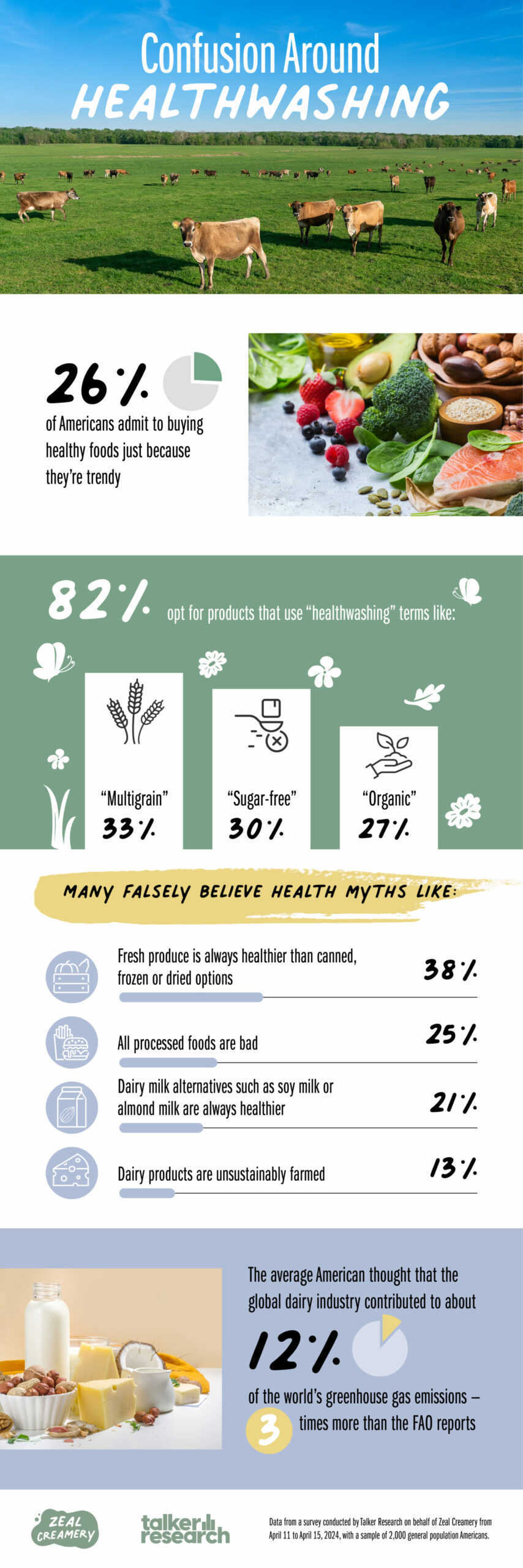By Vanessa Mangru-Kumar // SWNS
NEWS COPY W/ VIDEO + INFOGRAPHIC
Thirty percent of Americans admit to buying healthy foods just because they’re trendy, according to new research.
A survey of 2,000 adults looked at their food purchasing practices and found that 65% rate their grocery shopping habits as at least somewhat healthy.
When stacked up against other priorities, however, healthiness (18%) came fourth, surpassed by cost (64%), quality (36%) and personal and household preferences (19%).
Conducted by Talker Research for Zeal Creamery, the survey found that still, 82% opt for products that use “healthwashing” terms — labels intended to convey a product’s health benefits — like “multigrain” (33%), “sugar-free” (30%) and “organic” (27%).
Among those terms, others that respondents view positively are “high-in” (31%) and “free-range” (30%).
Above all, the top grocery category Americans would be willing to splurge on is organic produce (25%).
While Americans are most confident in their understanding of “organic” (65%), “sugar-free” (65%) and “multigrain” (64%) products, they’re admittedly less sure when it comes to “reduced” (23%), “fortified with” (22%) and “light” products (21%).
With all of the different healthwashing terms out there, nearly a third of those surveyed feel overwhelmed by the labels on their foods while shopping (31%).
For many, this leads to misinformation, like the belief that fresh produce is always healthier than canned, frozen or dried options (38%) and that all processed foods are bad (25%).
Similarly, a fifth of respondents mistakenly believe that dairy milk alternatives such as soy milk or almond milk are always healthier (21%), while one in eight are under the impression that dairy products are unsustainably farmed.
“The survey results reflect the reality that Americans can be exposed to exaggerated claims about the impact of dairy on the environment versus the positive impacts that pastoral, regenerative farming has on the environment," says Jason Henshaw, president of Zeal Creamery. “The upside is that there’s a huge opportunity for people to learn about dairy sustainability, regenerative grass-fed farming and how to incorporate that into their choices.”
Sustainability is an important factor for one in six respondents when grocery shopping.
Yet, few survey-takers were aware that products like rice (7%), soybeans (8%), mineral water (8%) and almond milk (10%) are harmful to the environment.
And nearly a fifth view the dairy industry’s impact on greenhouse gas emissions as negative (18%), while most weren’t sure or didn’t believe it had much effect (52%).
The average American thought that the global dairy industry contributed to about 12% of the world’s greenhouse gas emissions — three times more than the Food and Agriculture Organization of the United Nations reports. Similarly, the US Environmental Protection Agency found that dairy cows contributed to just 1.3% of US greenhouse gas emissions.
Henshaw points out that a quarter of respondents felt surprised (25%) and a fifth interested (21%) at this revelation, saying, “A lot of Americans enjoy dairy and want to feel good about their food choices.”
GROCERY ITEMS AMERICANS WOULD SPEND MORE MONEY ON
- Organic produce — 25%
- “High in” (e.g., vitamins, calcium, etc.) — 24%
- Sugar-free — 21%
- “Reduced” products (e.g., reduced fat, reduced sugar, etc.) — 20% [TIED]
- Free-range —20% [TIED]
- Multigrain — 20%
- “Fortified with” (e.g., vitamins, minerals, etc.) — 19%
- Organic dairy — 16%
- “Light” products (e.g., light salad dressing, light salt, etc.) — 16%
- Pasture-raised — 12%
Survey methodology:
This random double-opt-in survey of 2,000 general population Americans was commissioned by Zeal Creamery between April 11 and April 15, 2024. It was conducted by market research company Talker Research, whose team members are members of the Market Research Society (MRS) and the European Society for Opinion and Marketing Research (ESOMAR).




